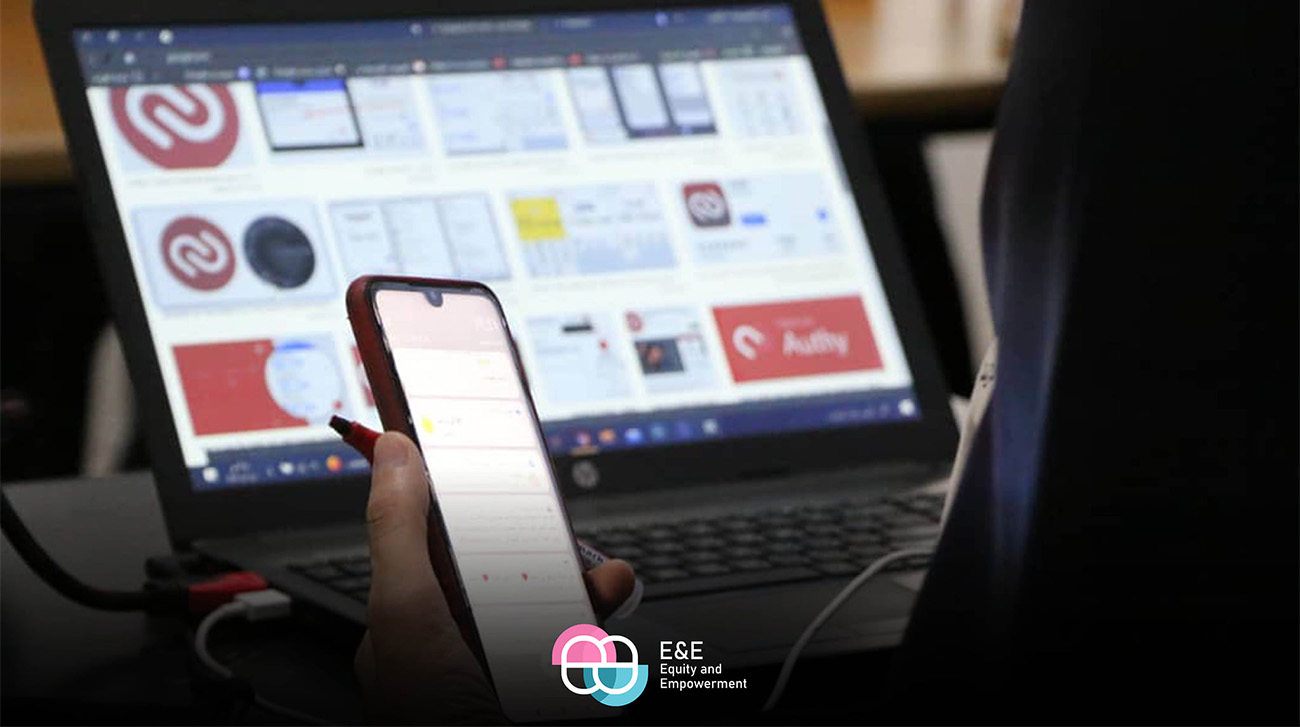
The project “Enhancing Digital Rights and Human Rights Writing for Women in Kafr Yahmul” was launched to empower women with the knowledge and skills necessary to navigate the digital world safely and effectively. This project was implemented from March 2 to November 15, 2021, in Kafr Yahmul, directly benefiting 155 women and indirectly impacting 755 individuals. The initiative focused on training women in digital rights, digital security, electronic device maintenance, and academic writing, with the goal of enabling them to protect themselves from exploitation, start small projects, and engage in academic writing on human rights.
Believing in the importance of transferring the knowledge they gained, 50 trainees from the Justice and Empowerment Center in Kafr Yahmul trained 150 women on the essential skills and knowledge they acquired during the center’s sessions, which focused on:
Understanding and affirming digital rights are crucial, especially for women in marginalized communities. These rights include access to information, freedom of expression, privacy, and protection from digital harassment and exploitation. For many women in rural or conflict-affected areas, the digital divide can exacerbate existing inequalities, limiting their opportunities for education, employment, and civic participation.
This project addressed these challenges by providing comprehensive training on digital rights and human rights. This approach aimed to empower women to become active participants in the digital realm, capable of protecting their rights and contributing meaningfully to their communities.
The project was carried out in two phases, each with distinct goals and activities:
Phase One (March 2, 2021 – June 15, 2021):
Phase Two (June 16, 2021 – November 15, 2021):
The trainees contributed to the preparation and production of videos as part of the project.
The project successfully trained 155 women, equipping them with the knowledge and skills needed to protect their digital rights and engage in academic activities and entrepreneurship. The multiplier effect of this training reached an additional 755 individuals, as participants shared their knowledge with family and community members. The project enabled women to become more self-reliant, better able to defend their rights, and more confident in pursuing opportunities.
“Enhancing Digital Rights and Human Rights Writing for Women in Kafr Yahmul” demonstrates the ability to create educational and training initiatives and spread them among women by transferring knowledge. By focusing on rights and digital security, the project addressed a significant gap in the participants’ knowledge and skills, enabling them to navigate the digital world safely and confidently. The inclusion of academic writing and entrepreneurship training increased their opportunities, allowing them to express their experiences and ideas and pursue new projects.
This project highlights the importance of a comprehensive approach to empowering women, especially those in marginalized communities. By providing the tools and knowledge necessary to assert their rights and achieve their goals, such initiatives can make a lasting impact and contribute to building a more just and equitable society.
you can read digital security book which was produced by E&E
The project “Enhancing Digital Rights and Human Rights Writing for Women in Kafr Yahmul” was launched to empower women with the knowledge and skills necessary to navigate the digital world safely and effectively. This project was implemented from March 2 to November 15, 2021, in Kafr Yahmul, directly benefiting 155 women and indirectly impacting 755 individuals. The initiative focused on training women in digital rights, digital security, electronic device maintenance, and academic writing, with the goal of enabling them to protect themselves from exploitation, start small projects, and engage in academic writing on human rights.
Believing in the importance of transferring the knowledge they gained, 50 trainees from the Justice and Empowerment Center in Kafr Yahmul trained 150 women on the essential skills and knowledge they acquired during the center’s sessions, which focused on:
Understanding and affirming digital rights are crucial, especially for women in marginalized communities. These rights include access to information, freedom of expression, privacy, and protection from digital harassment and exploitation. For many women in rural or conflict-affected areas, the digital divide can exacerbate existing inequalities, limiting their opportunities for education, employment, and civic participation.
This project addressed these challenges by providing comprehensive training on digital rights and human rights. This approach aimed to empower women to become active participants in the digital realm, capable of protecting their rights and contributing meaningfully to their communities.
The project was carried out in two phases, each with distinct goals and activities:
Phase One (March 2, 2021 – June 15, 2021):
Phase Two (June 16, 2021 – November 15, 2021):
The trainees contributed to the preparation and production of videos as part of the project.
The project successfully trained 155 women, equipping them with the knowledge and skills needed to protect their digital rights and engage in academic activities and entrepreneurship. The multiplier effect of this training reached an additional 755 individuals, as participants shared their knowledge with family and community members. The project enabled women to become more self-reliant, better able to defend their rights, and more confident in pursuing opportunities.
“Enhancing Digital Rights and Human Rights Writing for Women in Kafr Yahmul” demonstrates the ability to create educational and training initiatives and spread them among women by transferring knowledge. By focusing on rights and digital security, the project addressed a significant gap in the participants’ knowledge and skills, enabling them to navigate the digital world safely and confidently. The inclusion of academic writing and entrepreneurship training increased their opportunities, allowing them to express their experiences and ideas and pursue new projects.
This project highlights the importance of a comprehensive approach to empowering women, especially those in marginalized communities. By providing the tools and knowledge necessary to assert their rights and achieve their goals, such initiatives can make a lasting impact and contribute to building a more just and equitable society.
you can read digital security book which was produced by E&E